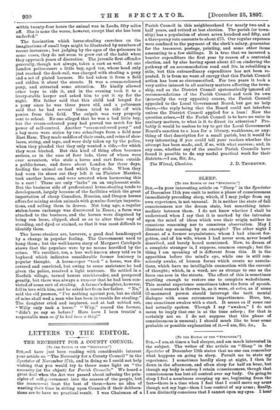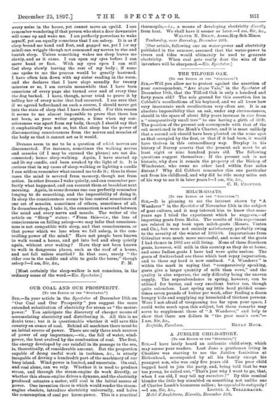SLEEP.
[To THE EDITOR OP THE " SPECTATOR."] SIR,—In your interesting article on " Sleep ' in the Spectator- of December 11th you omit to notice a phase of consciousness♦ immediately preceding sleep, which, if I may judge from my own experience, is not unusual. It is neither the state of full consciousness nor the dream state, but something inter- mediate between them. I do not know whether I shall be understood when I say that it is marked by the intrusion upon the mind of ideas which owe their origin neither to conscious reasoning nor to conscious observation. May I illustrate my meaning by an example ? The other night I dreamt of a former acquaintance, whom I had almost for and of his wife, whom I had never seen, never heard described, and barely heard mentioned. Now, to dream of a complete stranger is, I suppose, common enough ; but the thing I am speaking of is different from this. It is the apparition before the mind's eye, while one is still con- sciously awake, of human forms which create no associa- tions, which have no intelligible connection with the current of thought; which, in a word, are as strange to one as the faces one sees in the streets. The effect of this is sometimes- startling enough to restore one to complete wakefulness. This mental experience sometimes takes the form of speech. A casual remark is thrown in, as it were, ab extra, as if some ill-mannered person should interrupt the tacit mental dialogue with some extraneous impertinence. Here, too,. one sometimes awakes with a start. It seems as if some one had actually spoken. Though I say "awakes," I do not mean to imply that one is at the time asleep ; for that is certainly not so. I do not suppose that this phase of consciousness is unusual; I should much like to hear some probable or possible explanation of it.—I am, Sir, &c., L.
LTO THE EDITOR OP THE " SPECTATOR."] am.at times a bad sleeper, and am much interested in the subject. The writer of the article on " Sleep " in the Spectator of December 11th states that no one can remember what happens on going to sleep. Permit me to state my experience. I sometimes hardly sleep at night, I then lie down in the afternoon, and often sleep for half an hour, but though my body is asleep I retain consciousness, though that consciousness has lost all control over my body. On going to sleep I feel a numbness creeping up me, beginning from the feet—there is a time when I feel that I could move my arms though not my legs—then I lose control of my arms; I am distinctly conscious that I cannot open my eyes. I hear every noise in the house, yet cannot move an eyelid. I can remember wondering if that person who shut a door downstairs will come up and wake me. I am perfectly powerless to wake myself, yet am equally conscious that I am asleep. It is as if eleep bound me hand and foot, and gagged me, yet I (or my mind) can wriggle though not command my nerves to rise and banish sleep. Unless something wakes me sleep leaves me slowly, and as it came. I can open my eyes before I can move hand or foot. With my eyes open I can still feel sleep slowly leaving the rest of my body ; if some one spoke to me the process would be greatly hastened. I have often lain down with my sister reading in the room, and she declares that I have slept soundly for twenty minutes or so, I am certain meanwhile that I have been conscious of every page she turned over and of every time the dog barked. I have, though, never tried to prove it by telling her of every noise that had occurred. I am sure tbat if we agreed beforehand on such a course, I should never get into the state of sleep that I have described. For this reason it seems to me almost impossible to prove that there has not been, as your writer argues, a time when my con- sciousness was apart from my body, though I should say that it emphatically was not so, but that sleep has the power of disconnecting consciousness from the nerves and muscles of the body so that it cannot act as it would.
Dreams seem to me to be a question of which nerves are disconnected. For instance, sometimes the walking nerves and muscles (if I may be excused the phrase) are not dis- connected; hence sleep-walking. Again, I have started up and lit my candle, and been awaked by the light of it. It is curious that in my cases of sleep-walking or lighting a candle I can seldom remember what caused me to do it ; thus in those oases the mind is severed from memory, though not from action. In other dreams I wake quietly, and oan remember per- fectly what happened, and can recount them at breakfast next morning. Again, in some dreams one can perfectly remember longing to do something, and the impossibility of doing it. In sleep the consciousness seems to lose control sometimes of one set of muscles, sometimes of others, sometimes of all. In dreamless sleep, I take it, the connection is severed between the mind and every nerve and muscle. The writer of the article on " Sleep" states : " From this—i.e., the loss of consciousness on falling asleep—we may infer that conscious- ness is not compatible with sleep, and that consciousness, or that power which we lose when we fall asleep, is the con- trolling power of the mind." Have not people been known to walk round a house, and get into bed and sleep quietly again, without ever waking ? Have they not been known to walk in dangerous places, such as the roof of a house, and not fall unless startled ? In that case, surely " the rider was in the saddle and able to guide the horse," though asleep ?—I am, Sir, &c., F. M.
[Most certainly the sleep-walker is not conscious, in the ordinary sense of the word.—ED. Spectator.]



































 Previous page
Previous page